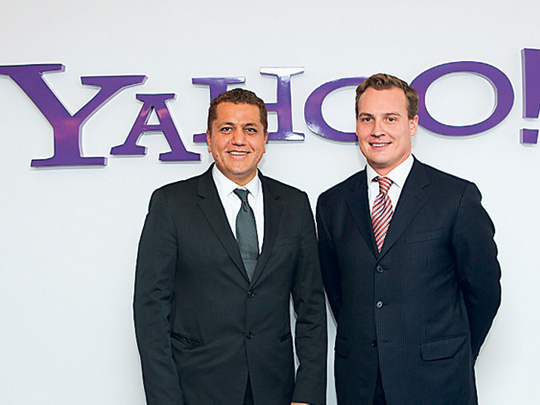
Dubai: Yahoo! is looking to increase its audience in the Middle East by providing more regionally and personally relevant content, including more articles in Arabic, says Rich Riley, the senior vice-president and managing director for Europe, Middle East and Africa (EMEA).
"We want Arabic to be part of the global plan," he told Gulf News. "So what you'll see is truly world class products like Yahoo Finance available in Arabic, Yahoo News in Arabic, sports, et cetera."
Riley said this is part of a major commitment to the Middle East by Yahoo!, which started with the acquisition of Jordan-based Maktoob, one of the largest news portals in the Arab world, in August 2009. Yahoo!, which has its regional headquarters in Dubai, is also expanding in Morocco, Egypt and Saudi Arabia.
The Silicon Valley-based company launched its new home page in the region last week, which includes content in both English and Arabic from local organisations such as Al Jazeera, Rotana, and Saudi Research, according to Ahmad Naseef, vice-president and managing director of Yahoo! Middle East. The company is also "in a middle of a lot of conversations now with local and regional publishers", he said.
Estimates
The reason for the expansion comes both from the region's growing rate of internet penetration and growing advertising market.
"In a lot of markets, we see a lot of user growth but no advertisers, which is still interesting, but here you have the display advertising market, which will grow 30-ish per cent in 2010 and probably faster next year," he said. "That's one of the fastest growing online markets in the world. So you combine that with fast user growth, and it's really an attractive market."
Global internet ad spending is expected to hit $106.6 billion (Dh392 billion) in 2011, according to IDC. Riley said Yahoo! estimates that online ad spend accounts for 1.5 per cent of the total ad spend in the Middle East, which he says is very low compared to more developed markets. The value of the Middle East internet advertising market is estimated to be growing between 25 and per cent 30 per cent, with more and more companies looking to go online.
"We feel a lot of demand for people to move adverting dollars online, because that's where users are spending more time," he said.
To attract those ads to Yahoo!, Riley said the company wants to be the centre of people's online life, and they plan on doing that with the help of the site's content optimization engine, which tracks what users view on the site.
"What we're trying to do is personalise the experience to an individual on a massive scale," he said.
"One of the things we've learned … is people want an incredibly customised experience, but they don't want to customize it. The percentages of users who will go do the settings, and do the ‘no, I want this over here and that over there' is very, very, very low."
Sensitive to piracy
Riley said the company is also sensitive to privacy issues, which have affected companies such as Google and Facebook recently.
"We always want to make sure we're in the consumers comfort zone, which is often more stringent then the regulatory and legal requirements."
Riley said the company is also open to the possibility of more acquisitions in the Middle East. "Yahoo is always opportunistic about looking for acquisitions," he said. "We have a strategy in the Middle East that is not contingent on any additional acquisitions, but we always have our radar on for something that makes sense."
As important as providing content is the ability to make sure Yahoo!'s audience can access it. The company's photo-sharing site, called Flickr, was unblocked in the UAE in September after five years. Riley said part of Yahoo's major investment in the region over the last 18 months has been establishing relationships with government agencies around the region.
So far, he said the company has always been able to have "open and rational conversations" about governmental concerns.
"There is a realization at the country level of the importance of internet technology companies and the impact of the economies of this countries, and we see that when we meet with government officials."











